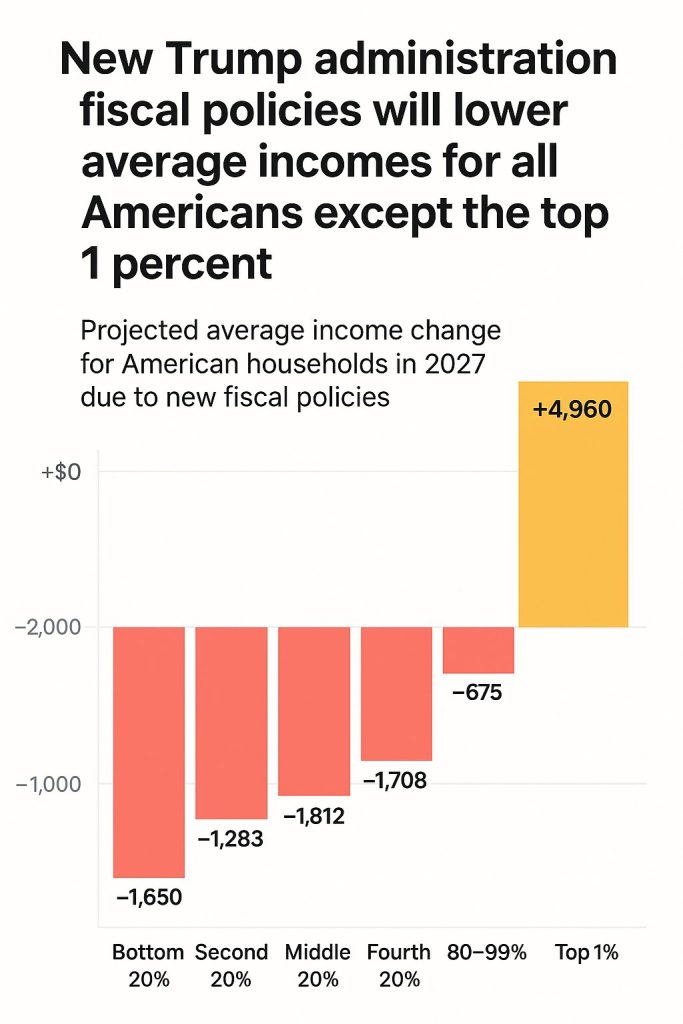In a controversial turn of events, new fiscal policies proposed by the Trump administration are projected to have a significant impact on American households by 2027. A recent report from the Center for American Progress reveals that while the wealthiest 1% of Americans will see their incomes increase by nearly $5,000, all other income groups are expected to face a decline in their net incomes.
The promise of economic growth through tax cuts and deregulation has long been a centerpiece of Trump-era governance. However, findings from the Center for American Progress juxtapose this narrative with alarming predictions. The projected financial landscape shows a stark divide: the average income of all households below the top 1% will diminish due to the policies aimed at boosting economic activity primarily for the wealthy. The implications of these policies could exacerbate the growing income inequality that has already reached concerning levels in the United States.
The income disparity depicted in a compelling bar chart included in the study illustrates how households earning below $350,000 per year are expected to experience income reductions, with the lower and middle-income brackets suffering the most. This scenario poses a troubling question: is the American economy truly “great” if its lowest-income citizens are struggling?
Policy analysts have raised concerns regarding the long-term consequences of the Trump administration’s prioritization of affluent individuals. The anticipated cuts to social programs and tax initiatives designed to help the middle and lower classes raise doubts about overall economic sustainability. Critics argue that the policies favoring the wealthy erode the financial fabric that supports broad consumer spending—one of the primary drivers of the U.S. economy.
The growing backlash from constituents highlights a widespread skepticism regarding the efficacy of such policies amidst rising costs of living, stagnating wages, and heightened economic insecurity for many Americans. For example, households making in the range of $50,000 to $150,000 will reportedly experience income losses that may further complicate their ability to manage everyday expenses, according to the report’s projections.
As social media platforms buzz with hashtags like #IncomeInequality and #WealthyGetWealthier, many users are amplifying their concerns and urging a reevaluation of fiscal priorities. Activists and community leaders are staging protests to raise awareness about the potential deterioration of living standards, while also demanding more equitable policies that prioritize inclusion and support for the greater population.
Advocates for economic reform stress the need for policies that genuinely uplift Americans across all income brackets rather than predominantly benefiting the elite. “For a country that prides itself on opportunity, it is crucial that any economic policies do not leave working families behind while enriching those who are already secure,” remarked Laura Jones, a community activist in New York.
With the stakes so high, the upcoming elections could serve as a pivotal moment for voters to assess the efficacy of the Trump administration’s economic legacy. As citizens navigate this complex economic terrain, the conversation around equitable income distribution will likely remain a core issue at the forefront of American discourse.
Where to Learn More
- New Trump Administration Policies Will Decrease Average Incomes for All Americans Except the Top 1% – Center for American Progress
- Income Inequality: What It Is and Why It Matters – Urban Institute
- The Case Against Income Inequality in America – Brookings Institution
- What Effects Does Income Inequality Have on Economic Growth? – Congressional Budget Office



